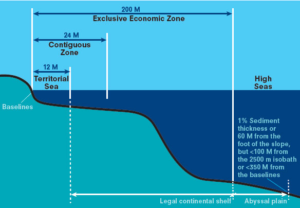In News: Recently, the US Navy has announced that it has carried out a Freedom of Navigation Operation in India’s Exclusive Economic Zone without New Delhi’s prior consent to challenge India’s “excessive” maritime claims.
What is the Issue ?
US Stand
- India’s requirement of prior consent is inconsistent with international laws and FONOPs
- The US not ratified the United Nations Convention on the Law of the Sea (UNCLOS) unlike India, China and many other countries, does regularly conduct FONOPs in the contentious South China Sea to challenge China’s aggressive territorial claims as well as in other areas including the Indian Ocean Region.
India’s Stand
- Rejecting the U.S.’s claim that its domestic maritime law was in violation of international law, the United Nations Convention on the Law of the Sea (UNCLOS).
Freedom of Navigation Operations (FONOPs)
- FONOPs linked to the concept of freedom of navigation,in particular to the enforcement of relevant international law and customs regarding freedom of navigation.
- FONOPs involve passage conducted by the US Navy through waters claimed by coastal nations as their exclusive territory.
- FONOPs is carried under the US policy of exercising and asserting its navigation and overflight rights and freedoms around the world”.
- These “assertions communicate that the US does not acquiesce to the excessive maritime claims of other nations, and thus prevents those claims from becoming accepted in international law”.
Significance of FONOPs
- FONOPs are a method of enforcing UNCLOS .
- It is exercised by sailing through all areas of the sea permitted under UNCLOS, and particularly those areas that states have attempted to close off to free navigation as defined under UNCLOS.
Exclusive Economic Zone (EEZ)
- EEZ prescribed by the 1982 UNCLOS
- Defined as an area of the sea in which a sovereign state has special rights regarding the exploration and use of marine resources, including energy production from water and wind.
- It stretches from the baseline out to 200 nautical miles from the coast of the state in question.
- The difference between the territorial sea and the exclusive economic zone is that the first confers full sovereignty over the waters, whereas the second is merely a “sovereign right” which refers to the coastal state’s rights below the surface of the sea.
UNCLOS
- The United Nations Convention on the Law of the Sea was adopted in 1982 at Montego Bay, Jamaica.
- It entered into force in 1994.
- Establishes a comprehensive set of rules governing the oceans and replaces previous U.N. Conventions on the Law of the Sea.
- The United Nations Convention on the Law of the Sea (UNCLOS) divides marine areas into five main zones namely- Internal Waters, Territorial Sea, Contiguous Zone, Exclusive Economic Zone (EEZ) and the High Seas.
- UNCLOS is the only international convention which stipulates a framework for state jurisdiction in maritime spaces.
- It provides a different legal status to different maritime zones.
- India played a constructive role in deliberations leading to UNCLOS’s adoption in 1982 and has been a party to the convention since 1995.

















